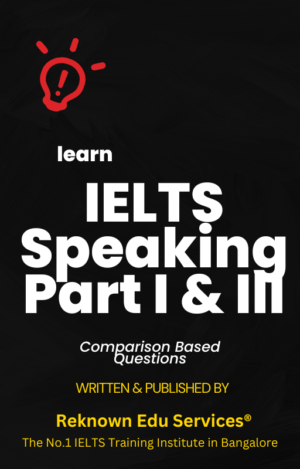Description
IELTS Speaking Part II – Descriptive Based Questions (Made for 2025)
IELTS Speaking Part II includes descriptive based questions, also known as the “Cue Card” section. In this part, the test-taker is given a topic on a cue card and is required to speak about it for 1-2 minutes. The topics are usually related to personal experiences, places, objects, events, or people.
These descriptive questions are asked in the IELTS exam to assess the test-taker’s ability to speak fluently, coherently, and with a good range of vocabulary and grammar. The aim is to evaluate their ability to provide detailed descriptions and express ideas clearly.
IELTS examiners expect the test-taker to:
- Provide a clear and detailed description of the given topic.
- Speak fluently and with a good pace, without frequent pauses or hesitations.
- Use a wide range of vocabulary, including descriptive adjectives and adverbs.
- Incorporate appropriate grammar structures, tenses, and sentence variations.
- Maintain coherence and cohesion by organizing ideas logically and using linking words and phrases.
- Support the description with relevant examples, personal experiences, or anecdotes.
- Use intonation, stress, and appropriate pronunciation to convey meaning effectively.
The purpose of these descriptive questions is to evaluate the test-taker’s ability to communicate effectively in English and to assess their proficiency in expressing themselves in a detailed and descriptive manner.
E-Book – IELTS Speaking Part II – Descriptive Based Questions
Our comprehensive Ebook is a valuable resource for IELTS test takers. It covers over 50 common topics that frequently appear in the exam. For each topic, you’ll find a well-crafted answer to the corresponding cue card question. These model answers serve as examples and inspiration to help you structure your own responses effectively.
Additionally, the Ebook includes a carefully curated list of popular vocabulary that can enhance your language skills and impress the examiners. This extensive vocabulary list covers various themes and contexts to cater to the diverse range of IELTS topics.
Furthermore, the Ebook provides a compilation of idioms that can be used to add depth and flair to your spoken and written English. These idiomatic expressions add a touch of sophistication to your language, showcasing your fluency and mastery.
With our Ebook as your study companion, you’ll gain valuable insights, learn effective strategies, and develop the necessary linguistic tools to excel in the IELTS exam.
Linking Words
Here are some useful linking words and phrases that can help improve coherence and cohesion in IELTS speaking and writing:
- Firstly, secondly, thirdly, etc.
- In addition, furthermore, moreover
- However, nevertheless, on the other hand
- Therefore, thus, consequently
- In conclusion, to sum up, in summary
- Likewise, similarly, equally
- For instance, for example, such as
- As a result, due to, because of
- Despite, in spite of, although
- Meanwhile, meanwhile, during
- Otherwise, alternatively, on the contrary
- Not only…, but also…,
- On one hand, on the other hand
- According to, in accordance with
- Above all, chiefly, most importantly
Using these linking words and phrases can help create a logical flow in your answers and make them more cohesive and easier to follow. However, it’s important to use them appropriately and not overuse them. It’s also important to practice using them in a natural and fluent way.






Shriya –
I have alrdy bought this. I have been having difclty with accessing it.
reknownedu –
Shriya,
Can you immediately share your screenshot with us on whatsapp for the amount paid? What medium did you use to make payment?